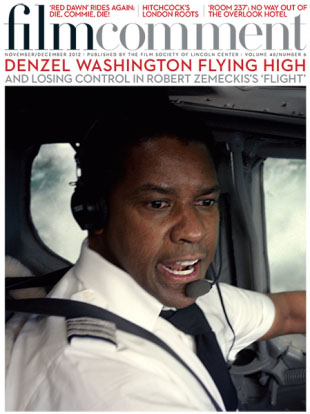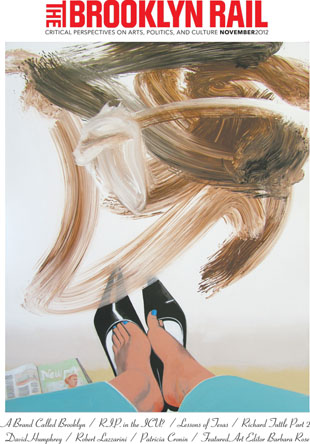The new November/December issue of Film Comment features Denzel Washington on the cover and editor Gavin Smith‘s argument that integrity is “the quality that Washington has most come to embody in his acting across 30-plus years.” From London, Richard Combs notes that, with the revival of the early work, the triumph of Vertigo (1958) in the Sight & Sound poll, and even in the dueling biopics Hitchcock and The Girl, this summer became “Hitchcock-takes-all season.”
And, reviewing Room 237, Rodney Ascher‘s documentary on an array of interpretations of The Shining (1980), B. Kite writes of Kubrick: “For all his carefully cultivated image as hyperrationalist chess-master to the muses, there’s a parallel sense that the films themselves are trying to push past the consciously thinkable and speakable to some area of unconscious transmission.” As for The Shining specifically, “Kubrick never grounds his overlooking eye at all, preferring instead to play through seemingly every variation on displaced, deceptive, and impossible POVs. Not the least of these centers on the telepathic communications of ‘shining’ itself, another vehicle for the pictographs of ‘pure cinema.'”
Also in this issue: Jesse P. Finnegan on La Furia Umana, the “top-shelf online journal of cine-culture written by a multinational, multilingual constituency of contributors,” Nicolas Rapold on Ashim Ahluwalia’s Miss Lovely, Rick Alverson’s The Comedy, and Paolo Sorrentino’s This Must Be the Place; Harlan Jacobson‘s interview with Cristian Mungiu; Andrew Chan on Wu Nien-jen’s A Borrowed Life; Emma Myers on David O. Russell’s Silver Linings Playbook; Chris Chang on Ken and Sarah Burns and David McMahon’s Central Park Five, Jeff Orlowski’s Chasing Ice, and Juan Antonio Bayona’s The Impossible; Violet Lucca on Tom Tykwer and Andy and Lana Wachowski’s Cloud Atlas; Graham Fuller on Joe Wright’s Anna Karenina; and Laura Kern on Jacques Audiard’s Rust and Bone.
There’s a new Brooklyn Rail out, featuring Eve Perry on Dirty Looks, a monthly ‘roaming’ program of experimental film and video, showcases contemporary works by queer artists alongside works by their historical predecessors in queer-oriented film and video,” and Joseph Klarl on Reminiscences of a Displaced Person, last month’s exhibition that served as “a companion to 1991’s partial autobiography I Had Nowhere to Go, in which [Jonas] Mekas details his trying time under Nazi rule and the melancholy following liberation.”
Also, two interviews: José Miguel Palacios‘s with Pablo Larraín and Leo Goldsmith with Phil Solomon; and Giampaolo Bianconi on Jeff Preiss’s STOP, “a film of beautiful observations and revelations, chronicling magnificent transformations and recent history with a feverish urgency.”
More reading. In Little White Lies, Matt Thrift looks back on the work of Jack Nicholson as a writer and director.
In other news. “An extensive archive of letters, book drafts, audio tapes and photographs relating to the film director Andrei Tarkovsky is to appear at auction in London,” reports the Guardian‘s Mark Brown.
“Aleksandr Sokurov has resigned from the board of directors of St. Petersburg’s Lenfilm studios, in a clash over plans for its redevelopment,” reports Nick Holdsworth for Variety. “The future of Lenfilm has been subject of intense discussion for the past two years with those backing continued public ownership frequently clashing with supporters of a privatized future.”
DVD/Blu-ray. At Artinfo, J. Hoberman reviews Fritz Lang: The Early Works, while at Slant, we find Calum Marsh on John Carpenter‘s They Live (1988), Chris Cabin on Billy Wilder’s Sunset Boulevard (1950), and Budd Wilkins on Robert Aldrich’s What Ever Happened to Baby Jane? (1962).
In the works. “Benedict Cumberbatch and Gemma Arterton look set to join the cast of the Monty Python troupe’s long-awaited return to cinema, Absolutely Anything,” writes the Guardian‘s Ben Child, citing a report in The Wrap. “Previously described as a ‘sci-fi farce,’ Absolutely Anything will feature Pythons Jones, Terry Gilliam, Michael Palin and John Cleese voicing aliens who are able to give humans the power to do ‘absolutely anything.'”
Obit. “One of Argentina’s best known film directors, Leonardo Favio, has died in Buenos Aires,” reports the BBC. “Mr. Favio was also a much-loved singer-songwriter, and had a number of hits in Latin America in the ’60s and ’70s.” He was 74. More from Diego Lerer (in Spanish).
Viewing (8’57”). David Davidson posts a video of Michael Snow discussing Objects of Vision, an exhibition on view at the Art Gallery of Ontario through December 9.
For news and tips throughout the day every day, follow @KeyframeDaily on Twitter and/or the RSS feed. Get Keyframe Daily in your inbox by signing in at fandor.com/daily.





